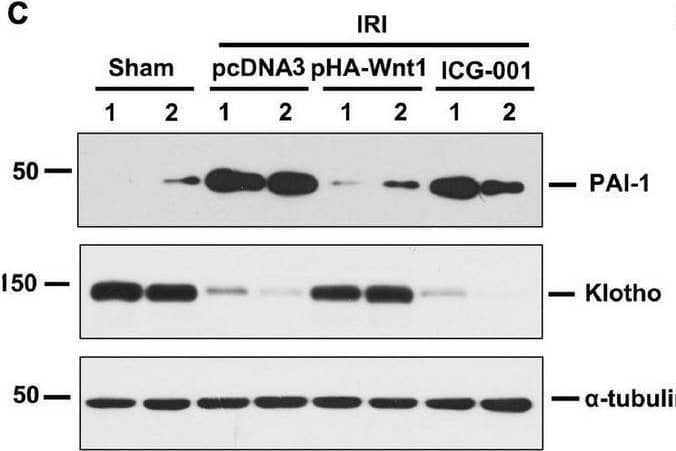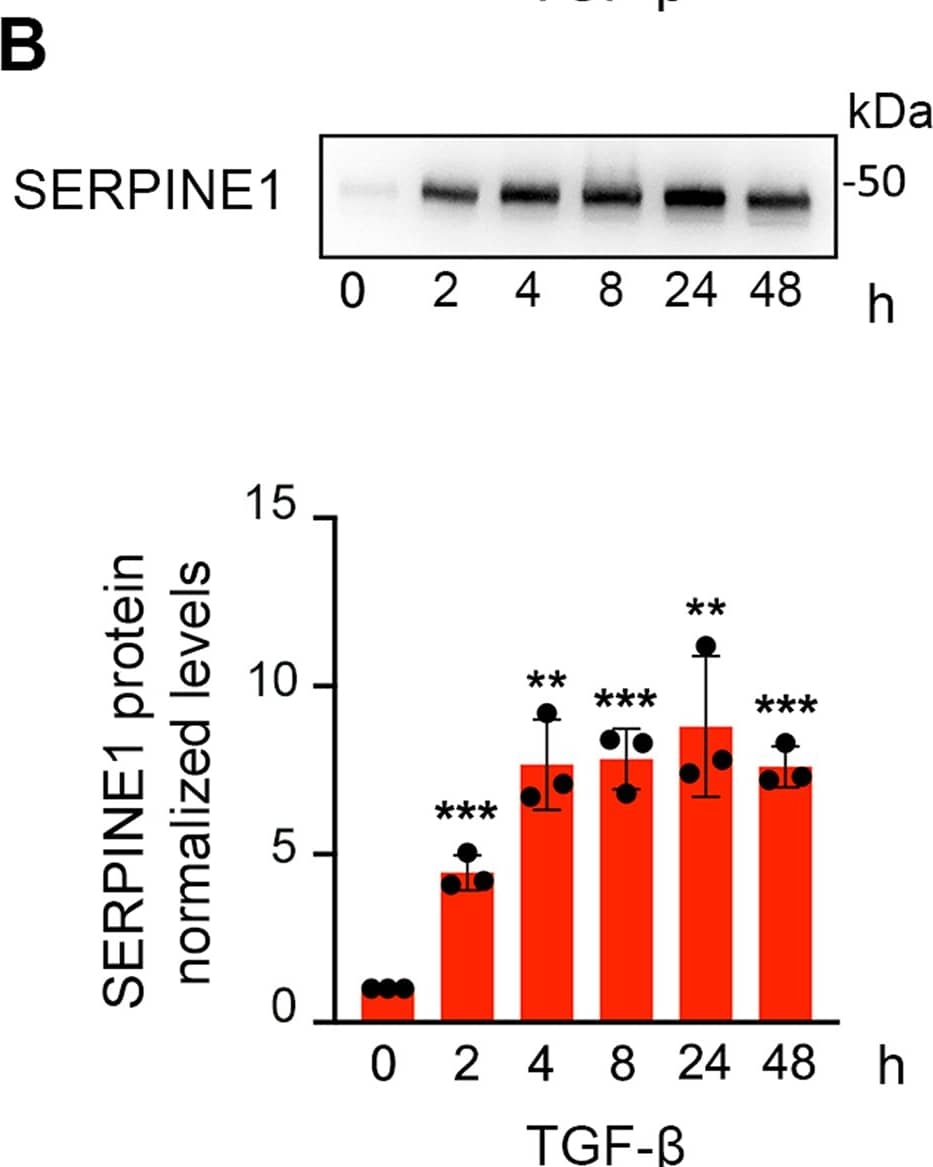Mouse Serpin E1/PAI-1 Antibody Summary
Leu24-Ser402
Accession # AAH54091
Applications
Please Note: Optimal dilutions should be determined by each laboratory for each application. General Protocols are available in the Technical Information section on our website.
Scientific Data
 View Larger
View Larger
Detection of Mouse Serpin E1/PAI‑1 by Western Blot. Western blot shows lysates of mouse placenta tissue. PVDF membrane was probed with 0.25 µg/mL of Goat Anti-Mouse Serpin E1/PAI-1 Antigen Affinity-purified Polyclonal Antibody (Catalog # AF3828) followed by HRP-conjugated Anti-Goat IgG Secondary Antibody (Catalog # HAF019). A specific band was detected for Serpin E1/PAI-1 at approximately 45-50 kDa (as indicated). This experiment was conducted under reducing conditions and using Immunoblot Buffer Group 1.
 View Larger
View Larger
Detection of Mouse Serpin E1/PAI‑1 by Simple WesternTM. Simple Western lane view shows lysates of mouse placenta tissue, loaded at 0.2 mg/mL. A specific band was detected for Serpin E1/PAI-1 at approximately 56 kDa (as indicated) using 12.5 µg/mL of Goat Anti-Mouse Serpin E1/PAI-1 Antigen Affinity-purified Polyclonal Antibody (Catalog # AF3828) followed by 1:50 dilution of HRP-conjugated Anti-Goat IgG Secondary Antibody (Catalog # HAF109). This experiment was conducted under reducing conditions and using the 12-230 kDa separation system.
 View Larger
View Larger
Detection of Serpin E1/PAI-1 by Western Blot In vivo expression of exogenous Wnt1 before IR downregulates renal Wnt/ beta -catenin target genes in mice after AKI-CKD progression. (A,B) mRNA expression of PAI-1 and MMP-7 in different groups as indicated. (C–E) Representative Western blot analyses of PAI-1 and Klotho protein levels. (F) mRNA expression of Klotho. *P < 0.05; **P < 0.01. n = 5. Image collected and cropped by CiteAb from the following open publication (https://pubmed.ncbi.nlm.nih.gov/34819873), licensed under a CC-BY license. Not internally tested by R&D Systems.
 View Larger
View Larger
Detection of Mouse Serpin E1/PAI-1 by Western Blot Serpine1 expression in TGF-beta –treated NMuMG cells. Relative levels of mRNA Serpine1 (A) and protein SERPINE1 (B) in cells treated with TGF-beta at the indicated times. A representative immunoblotting of SERPINE1 is shown. Quantification of Serpine1 and SERPINE1 in three independent experiments is shown. Error bars represent S.D. ***p < 0.001, **p < 0.01 by two-tailed Student´s t test. Protein-loading normalization was performed by measuring total protein directly on the membrane using the criterion stain-free gel imaging system. Image collected and cropped by CiteAb from the following open publication (https://www.nature.com/articles/s41420-024-01886-8), licensed under a CC-BY license. Not internally tested by R&D Systems.
Reconstitution Calculator
Preparation and Storage
- 12 months from date of receipt, -20 to -70 °C as supplied.
- 1 month, 2 to 8 °C under sterile conditions after reconstitution.
- 6 months, -20 to -70 °C under sterile conditions after reconstitution.
Background: Serpin E1/PAI-1
Serpin E1, also known as Plasminogen Activator Inhibitor-1 (PAI-1), is the principal inhibitor of urokinase-type and tissue-type plasminogen activators. It plays a major role in many processes such as angiogenesis, tumor invasion, and obesity. The amino acid sequence of mouse PAI-1 is 89%, 79% and 76% identical to that of rat, human/chimpanzee and dog.
Product Datasheets
Citations for Mouse Serpin E1/PAI-1 Antibody
R&D Systems personnel manually curate a database that contains references using R&D Systems products. The data collected includes not only links to publications in PubMed, but also provides information about sample types, species, and experimental conditions.
9
Citations: Showing 1 - 9
Filter your results:
Filter by:
-
(Pro)renin Receptor Is an Amplifier of Wnt/ beta -Catenin Signaling in Kidney Injury and Fibrosis
Authors: Zhen Li, Lili Zhou, Yongping Wang, Jinhua Miao, Xue Hong, Fan Fan Hou et al.
Journal of the American Society of Nephrology
-
beta -Arrestin Deficiency Protects Against Pulmonary Fibrosis in Mice and Prevents Fibroblast Invasion of Extracellular Matrix
Authors: Alysia Kern Lovgren, Jeffrey J. Kovacs, Ting Xie, Erin N. Potts, Yuejuan Li, W. Michael Foster et al.
Science Translational Medicine
-
Reduced secretion of neuronal growth regulator 1 contributes to impaired adipose-neuronal crosstalk in obesity
Authors: E Duregotti, CM Reumiller, U Mayr, M Hasman, LE Schmidt, SA Burnap, K Theofilato, J Barallobre, A Beran, M Grandoch, A Viviano, M Jahangiri, M Mayr
Nature Communications, 2022-11-25;13(1):7269.
Species: Mouse
Sample Types: Tissue Homogenates
Applications: Western Blot -
Acquired Deficiency of Peroxisomal Dicarboxylic Acid Catabolism is a Metabolic Vulnerability in Hepatoblastoma
Authors: H Wang, J Lu, X Chen, M Schwalbe, JE Gorka, JA Mandel, J Wang, ES Goetzman, S Ranganatha, SF Dobrowolsk, EV Prochownik
The Journal of Biological Chemistry, 2021-01-13;0(0):100283.
Species: Mouse
Sample Types: Tissue Homogenates
Applications: Western Blot -
Klotho retards renal fibrosis through targeting mitochondrial dysfunction and cellular senescence in renal tubular cells
Authors: J Miao, J Huang, C Luo, H Ye, X Ling, Q Wu, W Shen, L Zhou
Physiological Reports, 2021-01-01;9(2):e14696.
Species: Mouse
Sample Types: Tissue Homogenates
Applications: Western Blot -
C-X-C motif chemokine receptor 4 aggravates renal fibrosis through activating JAK/STAT/GSK3&beta/&beta-catenin pathway
Authors: Y Liu, Q Feng, J Miao, Q Wu, S Zhou, W Shen, Y Feng, FF Hou, Y Liu, L Zhou
J. Cell. Mol. Med., 2020-03-02;0(0):.
Species: Human
Sample Types: Cell Culture Lysates
Applications: Western Blot -
Wnt/?-catenin/RAS signaling mediates age-related renal fibrosis and is associated with mitochondrial dysfunction
Authors: J Miao, J Liu, J Niu, Y Zhang, W Shen, C Luo, Y Liu, C Li, H Li, P Yang, Y Liu, FF Hou, L Zhou
Aging Cell, 2019-07-18;0(0):e13004.
Species: Mouse
Sample Types: Tissue Homogenates
Applications: Western Blot -
Thymosin beta4 and its degradation product, Ac-SDKP, are novel reparative factors in renal fibrosis.
Authors: Zuo Y, Chun B, Potthoff S, Kazi N, Brolin T, Orhan D, Yang H, Ma L, Kon V, Myohanen T, Rhaleb N, Carretero O, Fogo A
Kidney Int, 2013-06-05;84(6):1166-75.
Species: Mouse
Sample Types: Cell Lysates
Applications: Western Blot -
Exogenous Wnt1 Prevents Acute Kidney Injury and Its Subsequent Progression to Chronic Kidney Disease
Authors: Xue Hong, Yanni Zhou, Dedong Wang, Fuping Lyu, Tianjun Guan, Youhua Liu et al.
Frontiers in Physiology
FAQs
No product specific FAQs exist for this product, however you may
View all Antibody FAQsReviews for Mouse Serpin E1/PAI-1 Antibody
There are currently no reviews for this product. Be the first to review Mouse Serpin E1/PAI-1 Antibody and earn rewards!
Have you used Mouse Serpin E1/PAI-1 Antibody?
Submit a review and receive an Amazon gift card.
$25/€18/£15/$25CAN/¥75 Yuan/¥2500 Yen for a review with an image
$10/€7/£6/$10 CAD/¥70 Yuan/¥1110 Yen for a review without an image

